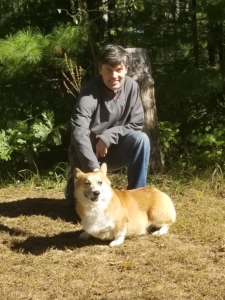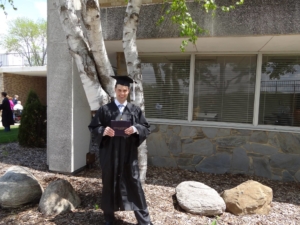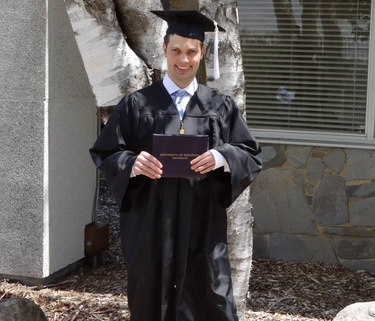Expecting the Best From Me
By Nathaniel Lentz
 Throughout my life there was one phrase that was ingrained in my brain: expect the best from myself. I always believed if there was something I really wanted to do, that I should not let my disabilities stop me. No matter how challenging or difficult something might be, I would work my hardest to succeed.
Throughout my life there was one phrase that was ingrained in my brain: expect the best from myself. I always believed if there was something I really wanted to do, that I should not let my disabilities stop me. No matter how challenging or difficult something might be, I would work my hardest to succeed.
It started when I was very young. My parents treated me like any other child. They didn’t make things easier for me, but they also realized that I would need extra help. They would work with my public school teachers to make sure I had the support I needed to pass my classes. Sometimes my teachers would try to make things easier for me because they thought regular class assignments would be too hard. That did not sit well with my parents.
I remember a meeting with my mom and my sixth-grade teachers. The teachers recommended that I sign up for a particular class because it did not require much writing. My mom strongly disagreed. She said more writing was what I needed, so I was assigned a class where the students had to write a lot, and I learned how to write.
From my elementary classes though the end of high school, I would study a lot more than most students. I would often spend weekends with my grandma. She would tell me that we could go to Taco Bell after I finished my homework. When I would wake up on Saturday morning, there would be a pile of practice tests and assignments that I had to finish before I could get some tacos.
When I was a senior in high school, I was interviewed by Disability Rights Wisconsin for a position speaking to high school parents and teachers about transitioning from high school to college or job training. That first engagement led to many more speeches advocating for people with disabilities at the local, state, and even the national levels.
My parents made sure that I took college prep classes, even though because of my learning disabilities, teachers thought I would never make it in college. But I had learned what I needed to succeed: study until I understood the material. A lot of my roommates would spend their weekends at parties or in bars. I spent my weekends in the library.

Working on my college degree gave me the confidence to advocate for myself. If I saw that a professor would not work well with me, I would change to another. The same applied to tutors who were unhelpful. I also developed strategies that were somewhat unorthodox to help me learn the information at a fast pace.
Another way I advocated for myself in college was with living arrangements. If I felt my prospective roommates would make it harder for me to study, or who would ridicule me because of my disabilities, I would schedule a meeting with the Housing Director, and she would find a dorm or a room where my roommates would be respectful.
Because I advocated for myself, my college experience was the best. I had the right support, the right accommodations, the best professors a student could ask for. That is how I earned my bachelor’s degree.
Because I had my bachelor’s degree and with my experience as a public speaker, I was appointed to a position on the Wisconsin Board for People with Developmental Disabilities. Before my eight-year tenure on the board had ended, I had served on numerous committees, including the Executive Committee, and I was the Chair of the Nominating Committee.
Since then, I have been appointed to the Living Well grant. I was also hired by People First Wisconsin as an Outreach Advocate and selected to be an officer on the National Council of Self Advocates.
In my work for the Living Well Grant, I reach out to people with intellectual and developmental disabilities to ask about their experiences with the Safe and Free Curriculum, a program created by the Living Well staff to help people learn about self-advocacy, how to reach personal goals, and how to live independently. I also assist the staff in writing follow up questions, as well as working on other projects.
As an Outreach Advocate for People First Wisconsin, I am facilitating meetings, reaching out to organizations for our Advocacy Information Discussion (A.I.D.) meetings, taking notes during our collaborative meetings, working on video projects, and assisting with the organization’s website.
My duties as a National Council of Self Advocates Officer deal with public policy at the national level. I work on documents about public policy, make recommendations, and serve on the Technology Coalition. I have been advocating for the public policy documents to be translated into plain language or accompanied by visual aids to make them more accessible to people who would be unable to understand the policies in their current form.
My main goal in working with these organizations is to help people with intellectual and developmental disabilities to learn what their rights are and how to advocate for what they need, so they can build a good life for themselves just like I have!








